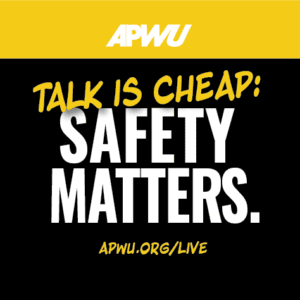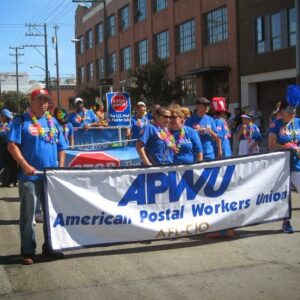September 1, 2015
Moving Forward on the Contract, Safety and Health
(This article first appeared in the September-October 2015 issue of The American Postal Worker magazine.)
The APWU participated in mediation on our contract throughout the summer, in sessions that were frequently contentious. We were candid and forthright throughout the process.
Although mediation utilizes the services of professionals who specialize in resolving disputes, we realize that ultimately, mediation requires a voluntary agreement.
For that reason, throughout the mediation process, we have been preparing for the possibility that our contract dispute will be resolved through Interest Arbitration. Those efforts continue.
Local Negotiations Soon Follow
Once the national Collective Bargaining Agreement (CBA) is settled, locals will start to prepare for local negotiations.
Labor-Management Committee meetings, which are outlined in Article 17.5 of the Collective Bargaining Agreement (CBA), provide an excellent opportunity to gather information, secure documentation, and memorialize conversations. The notes from these meetings can show the union’s attempt to address problems and can be submitted as evidence should you have to go to arbitration.
Many of our leaders have regular Labor-Management meetings and use the information they receive in the representation process. But there are many who don’t. One reason is that the Postal Service often doesn’t want to share information with the union. That is one of the many reasons we should have regular meetings.
Locals that haven’t been meeting regularly should immediately submit a request for a meeting on every issue of concern in your local, including consolidation, excessing, closures, staffing, safety, and issues related to the Family and Medical Leave Act (FMLA). You want to create an agenda that will get you information and results.
Don’t be discouraged if management’s team does not want to be there. That is another reason to have meetings: to force the USPS management team to share information. Where possible, the minutes should be signed at the end of the meeting, which now becomes a formal record of actions taken and agreements made.
State organizations are entitled to the same rights. They should also hold regular Labor-Management meetings to discuss problems in area offices and new POStPlan offices. In some districts, the District Managers hold Labor-Management meetings with the Union Leaders. That is a good time to add State and Local issues as agenda items.
At every level, the Union is entitled to request that management engage in Labor-Management meetings. This is a tool we can use to hold the Postal Service accountable and it helps us resolve problems.
Focus on Safety and Health
Over the past year, Regional Safety Representative Steve Vaughn, of the Indianapolis Area Local, has assisted the national union in addressing many safety and health issues. Over the last few years, we have not had a permanent Safety and Health liaison at the national level to provide guidance and leadership.
My goal is to hire a permanent Safety and Health specialist to provide technical guidance and serve as a liaison between APWU headquarters and the Regional Safety Representatives (RSRs) in the field. They would also work closely with me and the National Executive Board on matters of safety, including meetings with top OSHA officials.
Areas we have been working on include:
- Answering questions from field offices and individual members;
- Assisting in filing OSHA complaints from all areas, as well as at the national level;
(91 OSHA complaints were filed against USPS from Oct.1 to Dec 31, 2014)
- Re-establishing National Safety Committee meetings with the USPS;
- Challenging the USPS on safety and health related matters (such as changes to Chapter 8 of the Employee and Labor Relations Manual (ELM), Management Maintenance Orders (MMOs) and Electrical Work Plans (EWP);
- Meeting with USPS to complete District Safety Committee training guidelines;
- Attempting to negotiate changes to Article 14 to provide training to safety committee members at all levels (local, district and area).
- Forcing the USPS to allow and fund APWU representatives to participate in EWP audits at facilities.
Our goal is to extend safety and health outreach beyond the RSRs. We would like to have a safety representative in every state, providence and territory where the APWU members work. From there, we want to have safety contacts in the local offices. With this structure, we could create a network of information on issues that touch every member.
So far, we have:
- Prepared an APWU safety and health Mission Statement.
- Created an APWU safety and health logo.
- Created forms to track accident/incidents, hazardous spills, and suspicious mail/material incident reports. This way, we can follow up with the USPS on identifying and correcting hazards that occur in many offices but are treated as isolated incidents.
- Reviewed the national APWU safety and health webpage with the goal of updating material.
- Prepared a national survey on safety and health topics, including questions specific to each craft.
- Prepared a Standard Operating Procedure (SOP) for safety representatives in the field, including at the state and local levels.
- Researched training grants to help underwrite the cost of providing RSRs with needed training.
Our goal is to provide knowledge to our RSRs and authorize them to attend state and regional meetings and seminars to conduct training at every level. We also want to conduct annual surveys of APWU members to ensure that the USPS is providing a safe and healthy workplace.
The SOP will provide structure to the APWU safety program and get information flowing back and forth from headquarters to the field in a faster and more effective way.
The Industrial Relations Department will take a leadership role in Safety and Health as well as other topics that fall under my areas of responsibility. The goal is to develop written SOPs for the many functions in each area so that continuity can be established and maintained.



